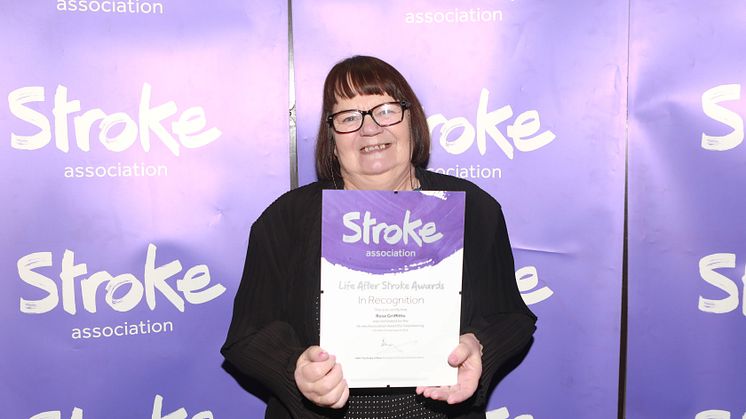
Press release -
Liverpool stroke survivor receives regional recognition
A stroke survivor from Liverpool has received a Highly Commended Life After Stroke Award from the Stroke Association, in recognition of her determination after a stroke which left her talking with a Russian accent.
Initially after her stroke in 2014, Rose Griffiths, 69, was told she would never walk or talk again. However, as her speech gradually returned, she was shocked to find herself with Foreign Accent Syndrome, speaking with a Russian accent instead of the Liverpudlian accent she’d always had.
Rose was working at Asda when she collapsed suddenly, temporarily losing all movement in her right hand side and the ability to speak, read and write.
She said: “The consultant said I would never would walk or talk again. Now I can’t stop talking! At first I wasn’t able to communicate with the outside world and it was very frustrating. I always thought I would be like this, but knew I wanted to get better. Through my determination I learnt to walk and talk again. I started to learn to write with my non-dominant hand.
“When my speech came back, at first I had a Russian accent although I was born in Liverpool City Centre! It then changed to Eastern European, then German. As I spoke more, it improved but I’ll ever get my own accent back. As long as I was able to speak again, I didn’t care what accent I had. My daughters were marvellous and never gave up on me, they helped me to get to where I am now.”
After being supported by the Stroke Association to improve her communication and support her emotionally to deal with the impact of her stroke, she was introduced to the charity’s Merseyside Life After Stroke Group. Now Rose volunteers at the local group and also with the charity’s service across Merseyside, while raising awareness of stroke at events in the region.
Rose added: “I love to chat with people but after my stroke, people didn’t want to talk to me because they thought I wouldn’t understand. I felt so lonely. Now I talk to everyone and people are patient with me because they understand I have had a stroke. It has helped me so much being at the Merseyside Life After Stroke Group and talking to other people. It’s shown me you can go as far as you want; you just have to be determined.”
Rose was nominated for a Life After Stroke Award by her Stroke Association Support Coordinator, Tess Hallam.
Tess said: “After receiving support from our Liverpool service Rose became a volunteer and she shows such passion for supporting other stroke survivors with aphasia and communication difficulties. Rose is an invaluable member of the Merseyside Life After Stroke Group, always on hand to make people feel welcome, and our communication groups would be lost without her.”
Rose received her Highly Commended certificate at a celebratory event at the AJ Bell Stadium in Salford on Thursday 31 January.
Chris Larkin, Director for the Stroke Association in the North, added: “A stroke happens in an instant and often changes lives forever. We were thrilled that so many local people across the North West were nominated to receive a Life After Stroke Award. Our regional event highlights the tremendous courage people like Rose have shown in rebuilding their lives after a stroke, or in helping others to do the same.”
The Stroke Association’s Life After Stroke Awards recognise the courage shown by stroke survivors and carers as well as the great work and commitment shown by health professionals, groups and supporter organisations. For more information visit www.stroke.org.uk/LASA
Topics

